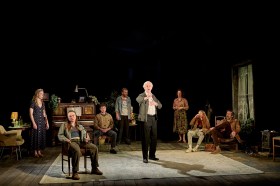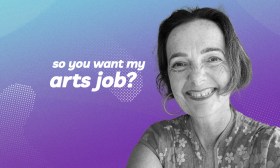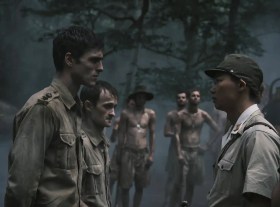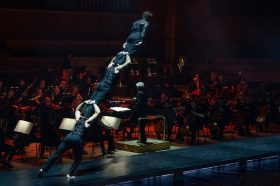We spend a lot of time in the arts celebrating our successes – the great plays, the best-selling books, box-office smashes, and critically acclaimed exhibitions. But what about our failures?
The mistakes we make in our careers and in our creative practices can be valuable in hindsight. They can fuel our drive to do better, be better, create better. In the words of the late, great Johnny Cash, ‘You build on failure. You use it as a stepping stone.’
Here, a range of artists and arts workers reflect on their personal failures and describe what they’ve learned from the experience.
Tim Rogers, musician, singer/songwriter
‘Our band was created through failure. When I had a breakdown and was forced to leave university and move back from Canberra to North West Sydney, I took a job when I could get on my feet again at a local pizza store. It didn’t feel like failure, I was happy to be sentient and surrounded by dough and tomato sauce and not therapy walls, but through the pizza store I made some bucks to buy an amp and I was within cooee of Nik and Jaimme, with whom I started You Am I. The failure of my nervous system created a band that gave me a life.’
Abdul Abdullah, artist
‘On my left arm I have a piece of my brother Abdul-Rahman’s advice tattooed in bold Helvetica: “No mistakes”. But a little further down on my hand I have the artist Richard Lewer’s advice: “So what”. I wouldn’t call any of these tattoos fuck ups, but they certainly reflect a transition in mentality that I have undergone since my early twenties. Now I see a mistake is only a mistake if I repeat it. Otherwise it’s just a stiff life lesson. If I learn from it, then there is a net positive gain. Now failure is an essential part of my development. I will now often push a work past a point where I happy with it until it is ruined, because I know it’s better to get something I am happy with and then go too far, then to never get there in the first place.
‘For me my most difficult time was the year I lived in Melbourne. It really felt like a failure, and it still kind of hurts when I go back. I moved there and didn’t get into VCA, made little to no inroads into the community, worked a bunch of jobs to support my practice, and then ended up running back to Perth. Looking back though, if I didn’t have that year of relative isolation, my practice wouldn’t have undergone the development it did. I was embedded with a sense of urgency and determination that has served me ever since. Now I live in Sydney. It’s better here. LOL.’
Andy Packer, Artistic Director, Slingsby
‘We all wish that every time we launch a new project into the world it will be a winner. But it seems that is not possible. I have come to appreciate that I actually learn more from the things that don’t land, the “failures”, than I do from the successes. When everything goes smoothly and the audience fall in love with what you have created it is of course a wonderful feeling – but it is often impossible to dissect how everything came together. How do we repeat that success precisely? But when things fail, and if you are willing to honestly assess the process that led to that failure, there are often some great lessons to take away – traps to avoid in future projects. So each failure teaches us something, makes us better artists. The successes feel nice but I am not sure they are as instructive.
‘Possibly the mistakes are there to hone our skills and the successes give us the courage to keep going. Eternal success probably leads to stasis anyway. Luckily I keep making mistakes and therefore I keep getting better at my craft.’
Felix Preval, Artistic Director, Darwin Festival
‘Of the many mistakes that have made me who I am today, there’s one I often share with younger theatre makers. Fresh out of uni and full of conviction, I started a theatre company with two close friends. We worked hard, we believed in each other and together we celebrated our successes. Somewhere along the way though, my co-director and I stopped giving our producer the kind of credit and support that she deserved.
We failed to see that the things that kept us going (applause? definitely not money) were not feeding her desire to work – to write and acquit grants, find new sponsors and run endless production meetings. By the time we realised, it was almost too late – she left the company but in doing so saved our friendship. It took years to restore the trust and joy we shared in those early years, and we never worked together again.
The lesson we learned? Love and respect your producer! Make time to celebrate the hard work of all the members of your team, especially those who are not on stage or in the first few credit lines – they deserve it, and if you don’t, you’ll miss them when they’re gone.’
Fiona Maxwell, CEO, Brisbane Powerhouse
‘Maybe my first failure was not sharing my own failings with others. I think people respect leaders who show some vulnerability, some weakness. When I commenced in leadership roles, I was relatively young, so very much felt I had to prove how capable and competent I was at every turn. I’ve found since that when people are struggling, to know that you too sometimes struggle, helps. I guess it’s about empathy. When you’re trying to grow leaders, they have to see how that pathway could play out for them, and how you once trod that same path.’
Jeffrey Jay Fowler, actor/writer/director, The Last Great Hunt
‘The biggest mistake I made early in my career was not being able to see my mistakes. I created a diamond strength ego to protect myself and to be able to work, but it meant that my practice stalled. I moved myself into the path of praise and didn’t seek honest feedback on my work. I feared older artists rather than asking them for mentorship. I took positive reviews to be proof of success. I gave up on projects if they didn’t get funded, rather than understanding that funding is insufficient and chaotic. I assumed my work was good because I had created it. I assumed success would come to me. I didn’t learn fast enough how to celebrate the success of others rather than envying it. I worked quickly rather than thoroughly. I never showed my scripts to anyone or sent them in for any contests but rather produced them all myself. It was the good advice that I just didn’t take.’
Jonathon Oxlade, artist and theatre designer
‘I think following instincts are a measure of how things pan out. If there is an undecided moment, an agonising feeling or misreading in communication, it usually ends is some form of mistake. It could be a dramaturgical one, an idea that isn’t fully realised, a hasty mending device that is unformed, a production problem due to assumption. These moments are usually based in not trusting the work that the artist(s) have already done. The inevitable “final solves” tend to look like obvious mistakes.
‘This is a terrible admission. I once completed a technical design drawing that was forwarded to a builder and fabricator to complete. It was a small, mushroom-shaped house, about 1.5 metres in height. The build began. I received some confused questions about the structure the builder had delivered to the fabricator. She said, “Jox, this is massive, I can’t cover it in the materials you gave me!”
‘”Send me a pic please,” I asked.
‘“Here is my Nan standing inside the house.” Alia (the patient fabricator) had sent me a photo of said Nan standing within what looked like a five metre, wooden framed, house structure. It was an enormously wrong scale. I had failed in a massive way at dimensioning the drawing. BIG ART MISTAKE. Lesson = triple-check all future drafting, and provide humility based gifts to all involved.
‘Sometimes an artist has looked to me to solve storytelling purely visually. This is pretty usual being a visual designer, but if the ideas rely on this problem-solving solely, it can be a problem. The rigour of the entire team makes work, work.
‘Choices in correct makers constructing elements for performance are so integral to a smooth construction process. Producers and production heads can go to their “usual people” without allowing the language of new or bespoke makers involvement. The process becomes about correcting or over describing ideas, convincing makers of what the work is; it becomes about teaching ideas to someone that is not equipped. If the situation is about teaching and integration, great! But most presenters want swiftness. Trust the leading artists to deliver without art mistakes.
‘An art mistake can be as simple as placing artists together that should work, but do not.
‘Realising that your art finishes at a point in a work and does not continue can feel like a mistake, and forgetting the other artists will keep the ball up. Relinquishing control and knowing when to step back can be the best unmistakable feeling.’
Kelly Chandler, writer and editor
‘The first mistake I made was to study journalism instead of creative writing at uni. At uni, I got trapped under inverted pyramids and had all the emotion beaten out of my writing.
‘My next mistake was to tell the panel assessing me for a cadetship at The Age that I was an “adrenaline junky,” because I thought that’s what they wanted to hear. When they knocked me back, it felt like the end of the world, but that was just because I didn’t have a clue what the world looked like.
‘They were right though. I’m way too slow a thinker to have survived in a newsroom, even back when there was fat in the editorial budget. I ended up at the quarterly magazine Voiceworks where we started urging each other to insert ourselves in our non-fiction pieces rather than pretending to be impartial. Nobody could stop us, because we ran the magazine. This changed how I saw writing forever.
‘I crushed on Helen Garner from afar, which made me a more honest writer and less likely to hide behind my own biases. Or statistics for that matter, although that’s also related to a decision I made in Year Nine that numbers weren’t for me, because I couldn’t see maths in the clouds when I looked out the window.’
Laura Milke-Garner, producer and managing director of MILKE
‘If you’re not making mistakes, you’re not challenging yourself enough, and I truly believe that. If you play it safe all the time, you’re not growing. I think it’s especially true when you’re producing a show.
‘In my line of work as a Producer a lot of what I do is guesswork and intuition, so somewhere along the line, it’s inevitable that a mistake is going to happen and yes I have made mistakes. The key is how you overcome it. Sometimes it’s hard to admit it, but I have always been first to acknowledge if I have made a mistake and not shy away from it. Be the person that says, “Yeah I stuffed that up” but then also come with a solution on how you can fix that problem going forward.
‘I heard an excellent made up word the other day, and that was “Flearning”. Failure + Learning. I think it’s great and we all need a bit of that in our creative world.’
Naomi Price, writer/producer/performer
‘It might sound like a total cop-out, but I don’t really see anything as a mistake, just as an opportunity to learn. If I had to list one experience as the most challenging, it would probably be when I transitioned from being the general manager of a theatre company to being a freelance performer and producer. It was so scary to suddenly be faced with the prospect of not knowing where your next pay check was coming from. I think my biggest mistake leading up to this time was letting someone else keep me small and not fully valuing the full breadth of my skillset. I felt apologetic for who I was, and almost gave up performing altogether, believing that my future belonged solely in the world of production and arts administration.
‘Thankfully, I allowed that potentially crippling time to become confident in who I am and what I know about this industry, and being out of my comfort zone enabled me to make some of the smartest professional decisions I’ve made. Less than six months after leaving full time employment, I landed a year-long acting contract, and not long after that Adam Brunes and I wrote our first show together which has toured nationally and internationally for nearly five years. Everything about this career is challenging! But I suppose that’s why it’s so rewarding.’


_Encounters-in-Reflection_Gallery3BPhoto-by-Anpis-Wang-e1745414770771.jpg?w=280)


